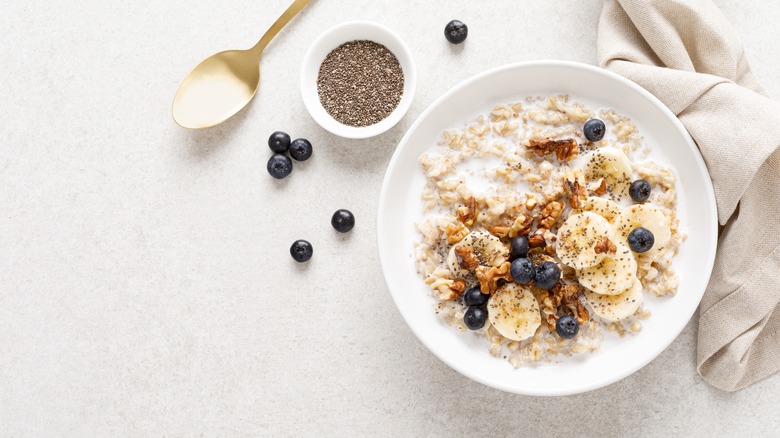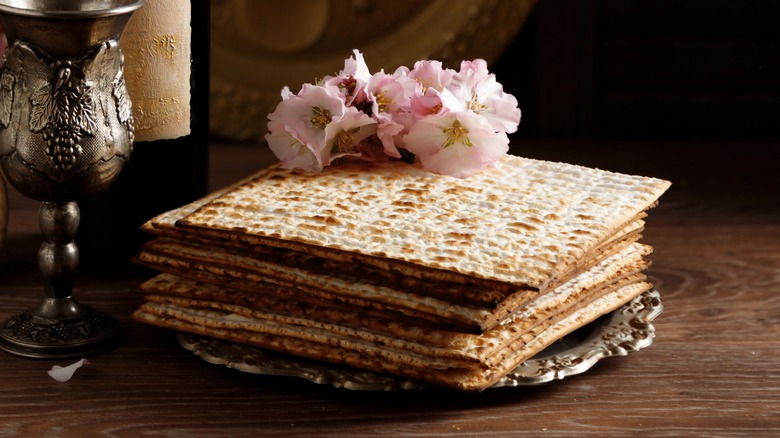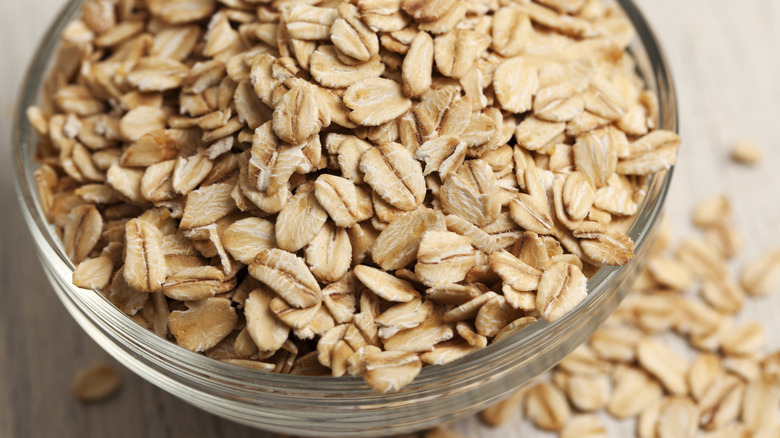Are Oats Considered Kosher For Passover?
Judaism has a lot of important holidays, and food is a huge part of most of them. Rosh Hashanah has apples and honey, Hanukkah has latkes and sufganiyot, and Purim has the wildly underrated hamentaschen. But maybe the best-known association between a Jewish holiday and food — matzoh and Passover — has to do with what you can't eat, rather than what you can. Most people know that during the eight days of Passover, Jews are traditionally forbidden from eating leavened bread, typically eating matzoh.
Only ... that's not technically accurate, or at least not entirely so. It's not just that Jews are forbidden from eating what's known as chametz: any food made of grain and water that's been allowed to rise. This includes bread, sure, but also includes a lot more, such as anything made from risen spelt, barley, wheat, rye — or oats.
So does that mean oats aren't kosher for Passover? Yes and no. Eating straight-up dry oats isn't actually against the rules — but if you make oatmeal or any other product where the oats get cooked, you're stepping out of bounds.
Jews eat matzoh on Passover as a way of remembering the Exodus
First, a quick history/theology lesson as to why Jews don't eat leavened bread on Passover. At the end of the Ten Plagues story in Exodus of both the Torah and Old Testament, the Hebrews were freed from slavery at the hands of the Egyptians. Understandably, the plan at that point was to get the heck out of Egypt as fast as humanly possible before the Pharaoh decided to do a takesies-backsies, meaning there wasn't even enough time to let the bread (anything that fell under the category of chametz) rise. So instead, the Hebrews brought their unleavened bread — what would become known as matzoh — with them as they fled.
Matzoh is thus a reminder of what Jewish ancestors went through as they fled Egypt and slavery. It's eaten on Passover as a way of commemorating this (hence why it's also called "the bread of affliction"), although, in modern times, it's often flavored enough that it's not exactly as unpalatable as it was historically. But matzoh is specifically allowed during Passover, while anything that falls under the category of chametz — which includes most typical oat preparations — isn't.
Oats are allowed, but oatmeal definitely isn't
Historically, eating chametz during Passover was enough of a trespass that the punishment, according to the Torah, is literally being expelled from the Jewish community in a practice known as karet/kareth. Obviously, that doesn't happen now, much as how eating meat on a Friday is no longer generally considered a hell-worthy trespass for Catholics. Still, some sources claim it's a violation of Talmudic law even to own chametz during Passover (regardless of whether you eat it), and that includes oat products.
Now, there's a loophole here: it's not specifically "oats" that are forbidden, but leavened oats. It technically counts as leavening if they're cooked or hit water — meaning dry oats are technically still acceptable, so if, for whatever reason, you feel like eating handfuls of dry oats, you're not in violation of the Talmud. This isn't really a thing that applies to the other potentially-chametz grains — nobody is out here eating a bowl of cold speltmeal regardless of the time of year — but it does come into play with oats. There's actually oat-based matzoh for people who can't eat the more typical wheat-based variety.
So as long as you don't cook oats or get them wet, they're fair game. Feel free to shovel all the raw oats you want into your mouth or eat oat matzoh.


